






























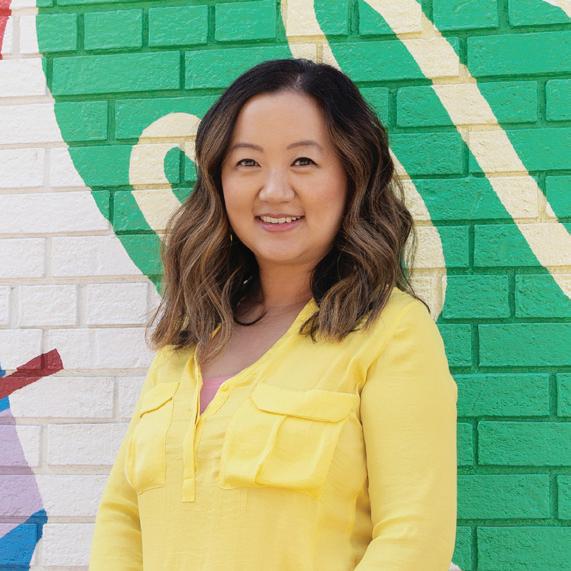
Annie Guo VanDan, President Asian Avenue magazine
Connect with us! hello@asianavemag.com @asianavemag
With the support of our community, we closed on the building for the Social Fabric Community Center in September. As we begin renovations for the space, we welcome you to share your ideas! @cacendenver
As the leaves change and we welcome the new brisk season, we also enter the height of election season. October will be a busy time for political candidates, like our friend Alyssa Nilemo, who is running for Colorado House District 44. In Colorado, you will soon receive your ballot in the mail and can vote ahead of time. Mail in your ballot or bring it to a drop-off location before or on Election Day (November 5).
For Asian Americans, despite our population growth, voter turnout has historically been lower compared to other racial groups. In the 2020 election, only 59% of eligible Asian Americans voted, compared to 66% of eligible voters overall. While this represents an increase from previous years, we still have a ways to go in fully exercising our electoral power. Check your registration at the Secretary of State website and make your plan to vote. Learn more about the Vote for Wellness Initiative and their resources to help support your mental wellbeing during these upcoming election weeks.
Congratulations to CU Denver for their Asian American and Native American Pacific Islander-Serving Institution (AANAPISI) designation! Across the nation, schools celebrated AANAPISI Week last month. The CU Denver AANAPISI team hosted a boba social to welcome students and the campus community to learn more about their goals and plans for the future. As an alumna of the school, I was proud to have been a part of the team to apply for AANAPISI and bring the designation to CU Denver! Looking forward to the impactful work ahead!

23 & 24



The Times


JENEVERRE SCHULTZ
ZHAO Videographer
Web
NGUYEN
ZHANG
JESSALYN LANGEVIN
on the cover
Broomfield City Councilmember Kenny Nguyen drops off his ballot in 2023. He now serves as Broomfield’s first Asian American elected official.
Cover photo provided by Kenny Nguyen
Asian Avenue magazine (ISSN 1932-1449) reserves all copyrights to this issue. No parts of this edition can be reproduced in any manner without written permission. The views expressed in articles are the authors’ and not necessarily those of Asian Avenue magazine
Looking to promote your business? Asian Avenue magazine offers businesses a costeffective way to reach consumers in the Denver/Boulder metro areas and beyond. For more information, call 303.937.6888 or e-mail us at hello@asianavemag.com for our media kit and ad rates. Send story ideas to hello@asianavemag.com.
Asian Avenue magazine is in association with the Colorado Asian Culture and Education Network.
& BEV: Great American Beer Festival returns to Convention Center
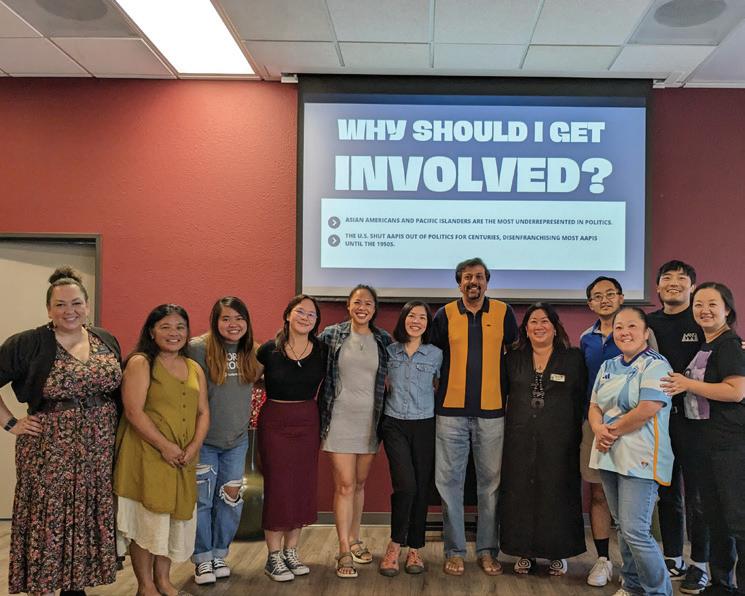
17 COMMUNITY UPDATE: Boulder hate attack on councilmember and youth troupe leads to bias charges
18 FEATURE: CU Denver celebrates its first AANAPISI Week as one of more than two hundred schools with the designation
21 ON SCENE: Mid-Autumn Festival in Far East Center was its largest event yet 22 ON SCENE: Tales of Sarees showcase the beauty and meaning of sarees, for Nepalese women and other community leaders







FUNDRAISER AND CAPITAL CAMPAIGN
Help CACEN develop the Social Fabric Asian American community center! Your support will go towards purchasing the building, architectural costs, renovations, equipment, and furniture to create a place of belonging for Denver’s Asian American community.
Online Donations
Fundraisers
Sponsorship Opportunities
The Community Center will feature:
Co-working and meeting space
Private offices for AANHPI nonprofits and businesses

AANHPI health/wellness providers and therapists
Incubator for entrepreneurs
Event space
Library highlighting AANHPI authors
Family friendly kids play area




Designs by Regular Architecture
October 8 to December 20
OZ Gallery
9209 Dorothy Blvd, Thornton Free admission, walk-ins welcome thorntonco.gov/community-culture/artsculture/oz-gallery-exhibits

Broomfield artist Shirlee Miyake specializes in mixed media and a variety of subject matter. She dyes, cuts, stamps, and intertwines old Japanese newspapers by incorporating origami and other handmade papers. She finalizes each art piece by adding details with acrylic paints and inks. A reception will be on Friday, October 18, 6pm to 8pm, and a free class on Saturday, November 9, 11am to 1pm.
Region V’s Annual Filipiniana Gala
Saturday, Oct. 12 | 5:30pm to 11pm
Hyatt Regency DTC 7800 E Tufts Ave, Denver, naffaaregionv.org/events
Tuesday, Oct. 15 | 5pm to 7pm
Anise | 865 Lincoln St., Denver Cost: $20 ACC Members | $25 General acccolorado.org
The Asian Chamber of Commerce will host its monthly Business After Hours event at Anise Modern Vietnamese Eatery. Guests can experience three Vietnamese appetizers paired with wines. Learn about the wines from a guest sommelier and network with others in the business community.

Friday, Oct. 25 | Begins at 6pm Posner Center | 1031 33rd St, Denver Ticket: $75
Children under 12 years old are free globalseedsavers.org
Celebrate another successful and exciting year at Global Seed Savers building food and seed soveregnity across the Philippines. The 14th annual Nourish Celebration is a time to come together as a community, hear inspiring stories of our work on the ground in the Philippines, and meet our new team members. The in person program in Denver will feature an exciting Filipino Artisans Market. Hal Atienza, the Philippines Executive Director and team members will join via Zoom to share a keynote message of inspiration. Denver tickets include delicious Filipino cuisine and refreshments.

Join for a night of cultural celebration at the Filipiniana Gala 2024 Sayaw at Kundiman! Immerse yourself in the beauty of Filipino-American folk dance and songs. This fundraising event will support NaFFAA Region V’s programs including: Fil-Am advancement, disaster preparedness, citizen engagement, and leadership & governance development. The gala will also have an award ceremony highlighting outstanding Fil-Ams in the Colorado community, and a dance presendation by Filipino American Community of Colorado. Don’t miss out on this unforgettable evening that will transport you to the heart of the Philippines!
Sunday, Oct. 20 | 11am to 3pm Simpson United Methodist Church 6001 Wolff Street, Arvada Free to attend simpsonumc.com
Enjoy this annual showcase celebrating the beauty of Japanese arts and crafts! Marvel at the exquisite handcrafted jewelry, textiles, and ceramics available for sale by members of the Japanese and Japanese American community. Engage with talented artisans and crafters and experience Japanese food. ou can find Asian inspired gifts, quilts, ornaments, jewelry, and more.

Saturday, Oct. 26 | 6pm to 10pm
The Parker Hotel, 18595 Mainstreet, Parker Cost: 40 Adult | $20 Child instagram.com/coloradofilipinos

The Filipino-American Community of Colorado (FACC) is celebrating Halloween and fundraising for their FACC Padayon cultural group together at the Boo Bash. The event will include a fashion show featuring items from Fly Designs. Entertainment will be provided by MFire Production, FACC Padayon, emcee Mary Ann and music by DJ Z. FACC will have costume contests, a dress to impress fashion show, food and of course, Halloween goodies for everyone.
Experience family fun at the Mile High Trunk or Treat at Empower Field on Friday, October 25, 5pm - 9pm, at Empower Field (Lot C), 1701 Bryant St, Denver, CO 80204.
As autumn paints the world with vibrant colors and the air turns refreshingly crisp, Far East Center and our community partners are thrilled to invite you to an unforgettable Trunk or Treat event! This FREE, family-friendly gathering offers a safe and fun way to celebrate, combining traditional trickor-treating with amazing resources.
Now in its fourth year, Far East Center is going bigger and better with a new location! The event is pet and family-friendly and offers free parking.
Culinary Delights: Indulge in seasonal treats from our food trucks and vendors, including Boba, sugarcane drinks, aqua fresca, Thai tea, and more! Enjoy delicious bites like Korean-style chicken sticks, Thai mango sticky rice, hot cocoa, dumplings, pumpkin bread,
Banh Mi sandwiches, cotton candy, caramel popcorn, and more.
Live Entertainment: Be mesmerized by K-pop performances, thrilling LED hula hoopers, magic shows, fire-eating acts, and a special guest DJ to keep you dancing all night!
Costume Contest: Show off your Halloween spirit! Prizes and gifts await for these categories: Best Decorated Trunk; Best Themed Group Costume; Best Kid Costume; Best Adult Costume; Best Family Costume; and Best Decorated Pumpkin.
Holiday Market: Kickstart your holiday shopping with unique gifts, anime collectibles, K-pop merch, local artisan vendors, and more!
Children’s Activities: Keep the little ones entertained with free face painting, balloon artistry, games, henna, and a bubble tower!
Pumpkin Decorating Station: Let the kids unleash their creativity with over 300 pumpkins to paint and deco-



rate (first come, first served).
Movie Station: Bring your cozy blankets and lawn chairs, grab some delicious food, and enjoy a movie on our large projector screen under the stars. Mini Haunted House: Dare to face your fears as you walk through our spooky haunted house. Will you make it out?
K-POP Zombie Random Play Dance: Watch as a flash mob of dancers takes over, grooving to K-pop hits and spooky Halloween songs.
Far East Center is committed to ensuring a safe and enjoyable experience for everyone. Join us in celebrating the spirit of community and Halloween fun!
For more information, visit: bit.ly/ milehightrunkortreat.

By Mary Jeneverre Schultz

Anne Akiko Meyers is one of the world’s most esteemed violinists. On October 2024, Anne will be inducted into the Asian Hall of Fame, which honors leading members of the Asian community across a wide array of disciplines.
Follow her on Instagram @anneakikomeyers or visit her website: anneakikomeyers.com.
Violinist Anne Akiko Meyers, who will be inducted into the Asian Hall of Fame this October, is coming to Denver to perform the Mendelssohn Violin Concerto with the Colorado Symphony and Douglas Boyd on October 4, 5, 6, 2024 at Boettcher Concert Hall.
Meyers plays on a piece of history. Her violin, the 1741 ‘Vieuxtemps’ Guarneri del Gesù, belonged to Henri Vieutemps during the 19th century and is one of the finest violins in existence due to its powerfully luxuriant sound and mint state of preservation.
Meyers is admired for her poetic interpretations, her deeply expressive music creates a rich sonic universe, much like a storyteller.
She is an incredible interpreter of beloved classical works and frequent collaborator with some of the greatest living composers. Named “the Wonder Woman of Commissioning” by The Strad, Meyers has worked with many of the greatest living composers of the last century, including Arturo Márquez, Philip Glass, Arvo Pärt, John Corigliano, Wynton Marsalis, Mason Bates, and John Williams.
Her album Fandango, featuring the live world premiere recording of Arturo Márquez’s: Fandango recorded with the Los Angeles Philharmonic and Gustavo Dudamel received two GRAMMY® nominations and two Latin GRAMMY® nominations.
Her mother played lots of music while pregnant with Anne, after reading that music helps a baby’s development. At age 4, Anne was introduced to the violin and took to it immediately. Meyers and her family moved to the Los Angeles area at age 7. She reminisced about the time they attended a concert at the Hollywood Bowl, sitting in nosebleed seats and eating bento boxes prepared by her mother.
“I was immersed in the music and how it washed over our bodies and senses,” she said. “It was really magical.”
She studied with Alice Schoenfeld, and chamber music with her sister, Eleanor Schoenfeld. As the leader of the Angels Ensemble of California, she performed twice on the Tonight Show with Johnny Carson, That’s Incredible and the Emmy Awards Show. Just 11 years old, Meyers also performed with the Los Angeles Philharmonic and with Zubin Mehta and the New York Philharmonic at age 12.
At age 14, on invitation after performing for legendary teacher, Dorothy DeLay at the Aspen Music Festival, Meyers along with her mother and sister, embarked on a road trip from California to New York to continue her studies at The Juilliard School.
“It was eye-opening to see so much talent,” she said. “People from all over the world were studying and believing in their dreams to become musicians.”
In those six years, she crammed high school, pre-college, and college, graduating at 20 years old.
At age 18, her first recording included the Barber and Bruch Violin Concertos - with the Royal Philharmonic Orchestra at Abbey Road Studios in London. She has recorded over 40 albums since, available on all streaming platforms.
She finds inspiration with every musical director, conductor, orchestra, and chamber group. “There’s inspiration from every human being I’ve interacted with and from many different genres of music,” she said.
She even recalls visiting the defunct Tower Records and browsing through the CD’s. “I loved discovering new music and listening to everything that caught my curious heart and mind,
finding many hidden treasures.”
“I’m so grateful for the inspiration I’ve found in many different walks of life.”
Growing up, she spent her summers in Japan with her Grandmother. “The Japanese tradition is so inherent and a cherished part of my heritage that I celebrate and love,” she said.
Every musical performer has their own individuality. Their own unique sound.
“Being a musician, you work on creating and developing your own unique sound as your sound is your soul.”
When composing the work for Meyers, Márquez was inspired by Meyers’ Mendelssohn recording, specifically the violinist’s ability to bring out its lyrics, beautiful high notes, singing qualities, and challenging rhythms.
She also believes in innovation. “I’m constantly challenging myself to let the music sing freely,” Meyers said.
The program for the October concert in Denver includes:
• Tchaikovsky: Romeo and Juliet Overture – Fantasy
• Mendelssohn: Violin Concerto in E minor, Op. 64
• Sibelius: Symphony No. 3 in C major, Op. 52
This upcoming season, Meyers is scheduled to work with Grammy-winning American composer and conductor Eric Whitacre at Carnegie Hall. Meyers is also looking forward to recording works by American composer and pianist Phillip Glass with Gustavo Dudamel and the LA Philharmonic in October.
“I’m living my dream working with living composers,” she said. “There’s nothing like collaborating with these living legends in real time.”
Follow Mary Jeneverre Schultz on Instagram @Jeneverre.

Voting is a fundamental right in the United States, but for many Asian Americans, it’s a right that has not always been fully utilized. As the fastest-growing racial or ethnic group in the country, our voices are more important now than ever before. But why should we prioritize voting, and how can we ensure our community’s voices are heard? Let’s explore why voting is crucial for Asian Americans and how you can take the necessary steps to register and cast your ballot.
Asian Americans are a diverse and rapidly expanding community. According to data from the Pew Research Center, Asian Americans made up 4.6% of the total electorate in 2020, an increase from previous elections. Our numbers are growing: the Asian American population increased by 81% from 2000 to 2019, making us the fastest-growing racial group in the U.S. This demographic growth gives us the potential to significantly influence election outcomes at both local and national levels.
However, despite this growth, voter turnout among Asian Americans has historically been lower compared to other racial groups. In the 2020 election, just 59% of eligible Asian Americans voted, compared to 66% of eligible voters overall. While this represents an increase from previous years, we still have a ways to go in fully exercising our electoral power.

Voting starts with making sure you’re registered. Here are some resources to help you get started: Go to coloradosos.gov to register, check your registration, and find out where to vote.
Registration dates:
• Online registration deadline: Monday, October 28, 2024
• Register by mail deadline: Must be postmarked by Monday, October 28, 2024
• In person registration deadline: Tuesday, November 5, 2024
If you have moved within Colorado or changed your name, update your voter registration with your new location or your new name. Also update your state driver’s license or state ID card before the election. If you have moved permanently to another state, register to vote in the new state.

Representation: Elected officials create policies that affect everything from immigration to education and healthcare. Voting allows us to support candidates who understand the unique challenges our community faces, including language barriers, racial discrimination, and the fight for equitable access to resources.
Policy Influence: By voting, we can shape policies that directly impact our lives. Whether it’s pushing for immigration reform, advocating for mental health resources for our community, or ensuring representation in government, our votes can make the difference.
Combating Discrimination: In recent years, Asian Americans have faced rising discrimination and violence, notably in the form of anti-Asian hate crimes. Voting allows us to elect leaders who will advocate for our safety, push for stronger hate crime laws, and address systemic racism.
Community Empowerment: When more of us vote, we collectively demonstrate that Asian American voices cannot be ignored. This increases our political influence and ensures that our community is seen as an integral part of the American fabric.
By participating in elections, we help shape the future of our country and ensure that our voices are heard in government. The more we engage, the more politicians will take note of the issues that matter most to us.
Encourage your friends, family, and neighbors to register to vote and make a plan to vote in every election, whether local, state, or federal.
Let’s make sure the Asian American vote continues to grow, and together, let’s advocate for a future where our community thrives.

Colorado 50-50 is a nonpartisan group dedicated to gender parity for elected and appointed positions (in other words women should hold 50% of the seats). Colorado 50-50 has organized workshops and networking events for AANHPI women. Learn more at: colorado5050.org

South Asian community leaders set up the first ever Political Action Committee designed to fund and support candidates and electeds from our communities, along with allies, in future elections.

National Federation of Filipino-American Association Region V leads civic engagement efforts such as voter education, registration, protection and get out the vote initiatives. Learn more at: naffaaregionv.org


Since 2020, Colorado Asian Culture and Education Network (CACEN) has offered civic engagement programs, community resilience training, and AANHPI voter outreach. In 2023, CACEN trained 12 AANHPI community members on civic engagement opportunities, how local government works and ways take action (not only politically).
Each year, the organization participates in National Voter Registration Day and provides registration and election materials in Asian languages. CACEN previously led efforts to educate the community about the redistricting process.
Join CACEN and Asian Vibes in Denver for a civic engagement discussion and review of what you will see on your ballot on Thursday, October 10 in Denver. Learn more at: cacendenver.org


Learn more at: naapimha.org/vote-for-wellness
By: Elizabeth Sweet, NAAPIMHA
National Asian American Pacific Islander Mental Health Association’s Vote for Wellness Initiative is a voter engagement campaign supporting Asian American, Native Hawaiian, and Pacific Islander (AANHPI) communities to get out the vote while centering their mental health and well-being during election season.
The goals of the initiative are to increase voter participation within AANHPI communities by:
1) providing voter education and community spaces to support AANHPI individuals with mental disabilities & mental health challenges and/or the loved ones who support them during the election year, and
2) providing voter education through the lens of mental health education and increasing awareness around the importance of centering mental health & wellness during election season and being in touch with how elections and civic engagement impact our mental health and wellness.
For many, our first thoughts about what wellness is might have something to do with individual health, happiness, and personal self-care. NAAPIMHA hopes to expand our understanding of wellness to also be a measure of community and societal wellness that is a direct reflection of the world we shape through the decisions we make when voting and involving ourselves in civic engagement.
The American Medical Association recognizes voting as a structural determinant of health.
• Civic health is just as important as physical/behavioral health. Without a strong and healthy democracy, civil liberties, protection from discrimination, and just systems, there is no way for our communities to feel secure, safe, hopeful, and effective.
• Voting and elections shape the quality of and accessibility to healthcare systems.
• Elected officials offer differing levels of good and bad representation for AANHPI communities.
• Elections have impacts on our mental health and health outcomes as communities of color.
• Voting can increase our sense of efficacy and empower-

ment, which contributes to strengthening civic health.
• Voting and civic engagement can counter anxiety and hopelessness by helping us feel heard, like we are making a difference, and that political progress is shaped by our choices, increasing our personal health.
As AANHPI communities experience the mental health toll of Anti-AAPI hate, racism, and discrimination, similar impacts on mental health and the well-being of our communities exist in how elections directly shape the future of policy in crucial areas like addressing gun violence, our access to resources like healthcare systems, the strength of our democracy, and our lived realities and safety as marginalized communities of color. In addition, our communities hold so many intersectional immigrant, LGBTQ+, pregnant-capable, disabled, religious minority, and more identities that are often under attack.
At the root of this effort to create space for the full range of processing, grief, and care, is the idea that civic engagement, whether through voting or other means of political participation and activism, can be a form of self-care and wellness promotion. Civic engagement can empower us through our participation to feel a sense of political efficacy that can combat feelings of hopelessness and despair.
But sustainable civic engagement must also be actively cultivated and requires recognizing that beyond simply supporting and informing AANHPIs about how to vote, we also need to view and treat civic engagement as intrinsically tied to struggles for our communities’ liberation, humane policy, and fights for justice, which all ultimately tie back to supporting our mental health. We cannot power our movements with empty batteries or pour support into our community from empty cups.
AANHPI communities exist in historical and ongoing legacies of colonialism, imperialism, genocide, caste discrimination, religious persecution, displacement, intergenerational trauma, land theft, racism, violation of self-determination, and systemic oppression and we cannot ignore that this informs our political perspectives. This also underlies our potential sense of interconnection to issues impacting other marginalized populations domestically and abroad.

We need systems that validate us and earn our vote
Beyond getting politicians and political systems to recognize the political power and salience of AANHPI communities as a voting bloc, we also need these systems to make deep investments into our communities that go beyond surface visibility and into the inclusion of our communities in decision-making.
We should be allowed to call out how current systems are not designed for us and failing to support and uplift us. If we do not demand our political systems be both accessible and accountable, we risk our civic engagement work making voters feel tokenized and not authentically represented or heard.
We cannot push out singular messaging of “get out the vote” to AANHPIs without acknowledging and holding space for frustrations and growing apathy our communities may have toward political systems that currently seem unresponsive to our positions, opinions, and needs. Exhaustion, at the physical, mental, and spiritual/emotional levels, is common among those with lived mental health experience, community advocates, and organizers who don’t want to be told to simply show up at the ballot box without any hope for material, systemic gains for our communities.
AANHPI key issue priorities and views must be reflected and addressed by our systems of governance. This includes our support for Palestine, which has been resonating with AANHPI students across college campuses and beyond, calls for de-militarization and ceasefire, and strong opinions around the need to tackle the emergency of climate change and other issues disproportionately impacting our communities.
At NAAPIMHA, we thought hard about how to center nuanced, honest conversations around the importance of voters getting in touch with their values and centering considerations of whether certain elected officials may provide more receptive environments for our calls for change rather than thinking of any singular decision at the ballot box as the “right”, “best”, or “good” option. We deserve to feel heard and represented by our elected officials, who should have to earn our vote by demonstrating how their values and issue priorities reflect our own.
At the same time, we can recognize the role of voting in upholding and protecting the rights and resources of the most vulnerable members of our communities and shaping
systems, adopting a harm reduction lens. Another nuance we might embrace is framing civic engagement efforts as both making in-system appeals for better outcomes and nurturing mindsets around the possibilities and power of out-of-system, community-based spaces.
In closing, NAAPIMHA hopes to center an approach in our civic engagement work that holds multiple civic engagement complexities simultaneously. This involves honoring multiple truths: validating the emotional complexity and toll often associated with voting while recognizing the importance of sustained civic engagement. Sitting with our feelings around voting is important, even if those feelings are those of political fatigue. When we identify fatigue, we can then work to address how best to rest and restore. The election process and its outcomes have significant mental health impacts on AANHPI communities.
The National AAPI Mental Health Association (NAAPIMHA) invites members of the AANHPI community, particularly those working in frontline organizing, to join us for two different FREE virtual nonpartisan election season spaces for folks looking to process their thoughts, emotions, anxieties, and center their mental health during this election season in the form of:
Facilitated Wellness During Election Season Listening Sessions with mental health professionals on select Wednesdays around key election dates/events at 5-6 pm MT via Zoom on the following upcoming dates:
Wednesday, October 2nd, 2024 *join to decompress the day after the vice presidential debate!
Wednesday, October 30th, 2024
Wednesday, November 6th, 2024
Wednesday, November 13th, 2024
Wednesday, Jan 15th, 2025
Monthly Vote for Wellness Check-in Spaces on the last Tuesday of the month at 5-6 pm MT via Zoom on the following upcoming dates:
Tuesday, Oct 29, 2024
Tuesday, Nov 26, 2024
Tuesday, Jan 28, 2025
Register for sessions and get resources at: naapimha.org/vote-for-wellness
For more information, contact vote@naapimha.org
By Frank J. Schultz

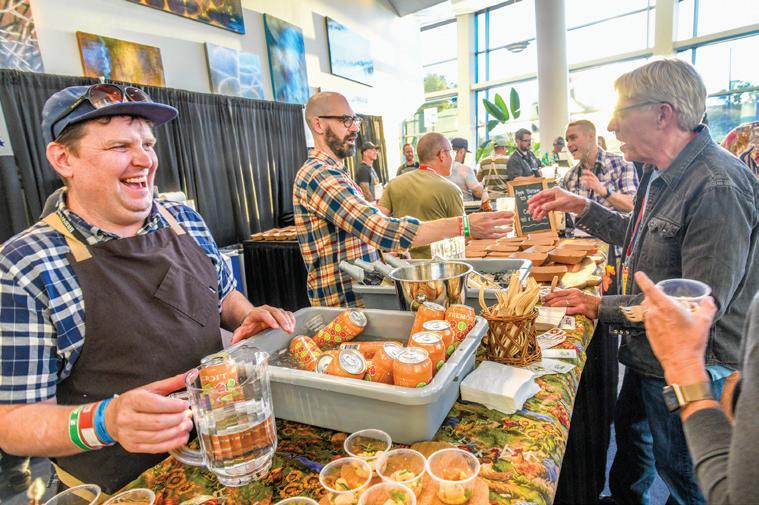
The Great American Beer Festival (GABF) stands as a celebration of the nation’s rich brewing heritage, showcasing a diverse array of craft beers from coast to coast. This annual event, held in Denver will be from October 10 to 12, offering beer enthusiasts a unique opportunity to sample thousands of brews from hundreds of breweries. From classic lagers to experimental sour ales, the festival’s lineup caters to a wide range of tastes, reflecting the vibrant and ever-evolving American craft beer scene.
Only two percent of breweries in the US are owned by Asian Americans, according to data from the Brewers Association. However, Denver-based Comrade Brewing is has been collecting awards through the years. The brewery showcases its flagship IPA, Superpower which won gold and silver in 2019 and 2020.
Themed areas will include: Prost! a traditional German biergarten; Score! a sports-lovers escape; Halloween: a timely October-themed experience that will delight and fright; Blast Off: an out-of-this world flavor blast featuring beyond beer beverages and more; Meet & Mingle: a re-invented Meet the Brewer experience; and Chill: a backyard gathering with music, lawn games, and exclusive brews.
New this year includes ready-to-drink (RTD) canned cocktails and a brand-new floorplan, featuring five new experience areas, and thousands of beers.
Don’t miss this annual celebration at the Colorado Convention Center! Tickets, selling at $85 per day or $220 for a three-day pass, are available for anyone of legal drinking age (21+) at www.great americanbeerfestival.com


On Friday, September 6, 2024, Nana’s Dim Sum and Dumplings on the Hill in Boulder, Colo. conducted a ribbon-cutting ceremony to celebrate its grand opening. The event highlighted Asian celebratory traditions such as lion dancing, dotting the eyes of the dragon, and drumming, which were performed by the Colorado Asian Cultural Heritage Center (CACHC). The CACHC team is mostly youth ages 8-16.
During the celebration, a man in his 20s came and began yelling racial slurs towards the Asian kids that were performing. Matt Jensen, a Boulder Chamber ambassador, tried to lead the man away, but the man brandished a knife towards the crowd.
Boulder City Council Member Tara Winer asked the man to turn around so that she could take his picture to report him to the Boulder Police for hate speech. The man quickly ran up to her, punched her in the face, and threw her to the ground. Matt Jensen, along with two security guards from Illegal Pete’s, pulled the man away from Council Member Winer and subdued the man until police arrived.
The man was taken into custody and charged with felony menacing and assault charges, but he was quickly released on a PR Bond - also called “no cost bail.” Council Member Winer suffered bruised ribs, headache, and other bumps as a result of this attack. The Boulder County District Attorney’s office filed two bias motivated crime charges and ten harassment-bias motivated charges.
How to Support Colorado Asian Cultural Heritage Center (CACHC): Please support the youth that performed as part of CACHC. An entirely volunteer-run group, CACHC formed in 2005. All of their revenue and donations go back to the kids to make sure that they have appropriate lion dance costumes and safety equipment for performances. Donate at: gofundme.com/f/support-cachc-team. Follow CACHC at: fb.com/CACHCdragonlion.

Report AAPI Hate Crimes: Stop AAPI Hate operates the nation’s largest reporting center tracking acts of hate against Asian American and Pacific Islander (AAPI) communities. With the support of respondents across the U.S. they have documented thousands of cases of anti-Asian and anti-Pacific Islander hate — ranging from verbal harassment to physical assault to discriminatory treatment at schools and businesses — allowing us to paint a vivid picture of racism and its effect on our communities.If you have experienced a racist act, or witnessed a racist act, please take five minutes to fill out our safe and confidential reporting form, available in 15 languages.
Report an act of hate: stopaapihate.org/report-hate Get more resources: actionagainsthate.org
Joint statement from the AANHPI community in regards to the attack on Boulder City Council Member Tara Winer
We are leaders of various organizations within the Asian American, Native Hawaiian, and Pacific Islander (AANHPI) communities in Colorado. We are issuing this joint statement to condemn the hate crimes that were perpetrated against our community and our supporters on September 6 in Boulder, Colo. It is especially outrageous that the racist perpetrator targeted children who were performing during a community celebration.
We want to express our gratitude to Boulder City Councilmember Tara Winer for putting herself in harm’s way to stand with our community. We also want to thank Boulder Chamber Ambassador Matt Jensen and the other people who quickly intervened and subdued the perpetrator before he could gravely injure Council Member Winer.
We strongly encourage the Boulder County District Attorney’s office to file charges of bias-motivated crimes (hate crimes) in this case.* The perpetrator intentionally targeted a group of Asian youths who were performing in front of an Asian restaurant. His action fits the definition of Bias-motivated crimes, as defined under C.R.S. § 18-9-121, because he intended to intimidate or harass our community because of our race, ancestry, and national origin.
Hate crimes against the AANHPI community are never acceptable, and we will always collectively respond to ensure that justice is served and that the victims receive the support that they need. We are grateful to all of our allies who have stood beside us in our fight against hate crimes.
*The District Attorney decided to file additional charges of Bias-Motivated Crimes in this case.
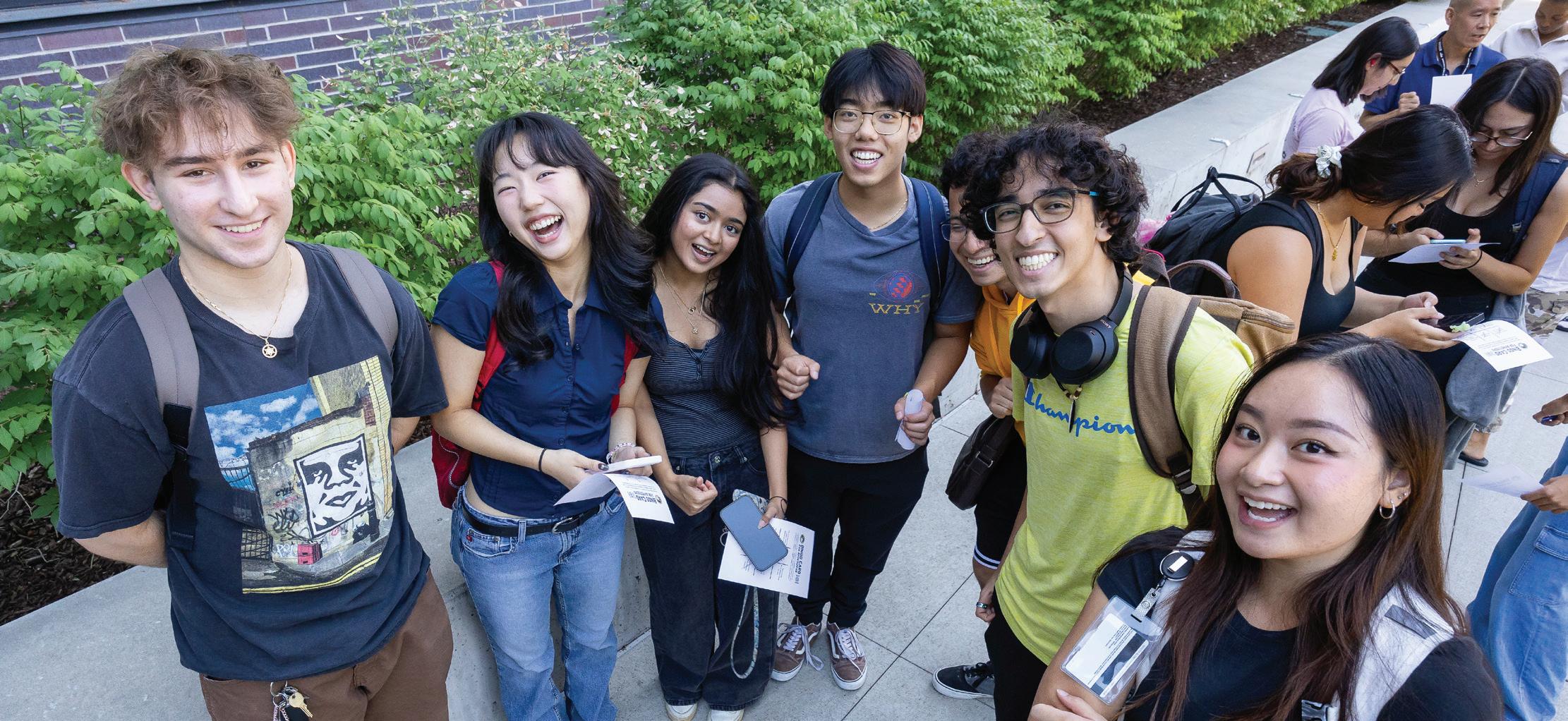
The University of Colorado Denver (CU Denver) celebrated Asian American and Native American Pacific Islander-Serving Institution Week, September 23 through September 29, 2024.
“This is our first ever AANAPISI Week celebration at CU Denver, which is a wonderful opportunity to cultivate community and celebrate the accomplishments of our AANHPI student-led AANAPISI team that has been working to design and pilot meaningful support services to increase student success and a sense of belonging on campus,” said Daranee Teng, AANAPISI Graduate Assistant.
CU Denver’s AANAPISI team celebrated the week with a boba social on September 28, by inviting students, faculty, and staff to learn more about the AANAPISI program, and explore initiatives designed to support AANHPI undergraduate student success.
“To be an AANAPISI institution means that we’re committed to ensuring that AANHPI students have the necessary resources to grow, prosper, and thrive in their educational journey as they de-
velop a holistic approach to academic success and student well-being,” said Teng. “It also means that we collaborate in solidarity with BIPOC and systemically marginalized communities beyond our own, recognizing that our successes are intertwined.”
According to Duy Tran, AANAPISI Program Director, CU Denver has made significant strides since receiving its Asian American and Native American Pacific Islander-Serving Institution (AANAPISI) designation and the accompanying $1.8 million grant from the U.S. Department of Education in May 2023.
As the first university in Colorado and the six-state Rocky Mountain region to attain this status, CU Denver has been actively working to enhance support for Asian American, Native Hawaiian, and Pacific Islander (AANHPI) students and the broader campus community.
One of the most notable aspects of CU Denver’s AANAPISI program is its
student-led approach, which is unique among AANAPISIs in the United States. The AANAPISI office has hired undergraduate and graduate students to participate in identifying with the approach that allows for a more tailored and responsive support system that directly addresses the needs of Asian American, Native Hawaiian, and Pacific Islander students, while also benefiting the broader student community at CU Denver. This initiative empowers students to play an active role in shaping the support systems and resources available to their peers.
| In the first year since receiving the designation, CU Denver has been proactive in identifying areas for improvement and development. The AANAPISI team conducted a comprehensive survey of over 300 students who identify as Asian or Pacific Islander to better understand their experiences and needs on campus. This data-driven approach has allowed the university to pinpoint


CU Denver AANAPISI’s mission is to cultivate a community of belonging by growing researched-based student success and mental health support, resources, and services for AANHPI students.

specific gaps and barriers faced by AANHPI students, informing the development of targeted support programs and resources.
| The grant funding is being used to boost academic programs and enhance mental health resources for students. CU Denver is working on implementing various student success initiatives, including expanded peer coaching and improved campus mental health services tailored to the needs of AANHPI students.
| While the AANAPISI designation specifically targets support for AANHPI students, CU Denver is committed to using these resources to benefit all students on campus. The university aims to create a more inclusive and supportive environment for students from all backgrounds, aligning with its goal of becoming an equity-serving institution.
| CU Denver has initiated outreach programs to local high schools, exposing diverse students to college-level courses and the possibilities of higher education. The university has also expanded dual-enrollment ethnic studies courses at area high schools, providing early access to culturally relevant education.
| The AANAPISI program at CU Denver includes leadership training and career exploration services, helping AANHPI students prepare for success both during their time at the university and after graduation.
As the program continues to develop, CU Denver plans to utilize the grant funding to create and develop a blueprint that provides additional resources and programming based on the identified needs of the stu-


“
Week is a crucial time for AANHPI students at CU Denver to connect, celebrate, and see themselves represented within the university community. It reminds us that our stories and experiences are valued, which fosters a deeper sense of belonging. Being an AANAPISI institution means CU Denver is committed to supporting and uplifting AANHPI voices, ensuring our cultures and contributions are recognized and respected.”
- Zhou Chen, CU Denver Undergraduate Student

dent population. The university is also positioning itself to apply for additional federal grants available to institutions with the AANAPISI designation, which will further enhance its ability to support AANHPI and other underserved student populations.
Through these initiatives, CU Denver is demonstrating its commitment to fostering a diverse, inclusive, and supportive aca-
demic environment that prepares students for success in an increasingly global workforce.
“We’re creating a space to understand the AANHPI community at CU Denver,” said Monica Vu, AANAPISI Undergraduate Assistant.
“By having a better understanding, we can create an environment that best addresses their concerns and needs to cultivate a community that understands one another.”



The CU Denver AANAPISI team includes:
Dr. Faye Caronan (Principal Investigator)
Dr. Samuel Kim (Co-Principal Investigator)
Dr. Terrence Hughes (Grant Writer)
Duy D. Tran (Program Director)
Tara Lepale (AANAPISI Cultural Research & Engagement Liaison)
Jihee Yoon (Research Implementation Specialist}
Graduate Assistants
Daranee Teng (Action Research Specialist}
Patricia Yumi Park (Student Success Specialist}
Salena Tran (Content Creation & Knowledge Dissemination Specialist}
Judy Tran (Mental Health Specialist}
Undergraduate Assistants
Monica Vu
Jaslyn Nguyen
Tien Nguyen
Zhou Chen
Jade Keomanivong
Grace Dunlap
Undergraduate Field Researchers
Lucie Dao
Nhi Dang
My-Quynh Ta
Bertina Quach
Our Nation’s nearly 200 Asian American and Native American Pacific Islander-Serving Institutions (AANAPISIs) open doors of opportunity for millions of Asian American, Native Hawaiian, and Pacific Islander (AA and NHPI) students. AANAPISIs provide a pathway to the middle class and a better life for their students, many of whom often come from low-income neighborhoods and may be the first in their families to attend college. During AANAPISI Week (September 23 through September 29, 2024), we celebrate these critical institutions for the resources and support they provide to students, and we recommit to advancing their mission and success. AANAPISIs play a critical role in the lives of so many of our Nation’s AA and NHPI students.
See full proclamation at: whitehouse.gov
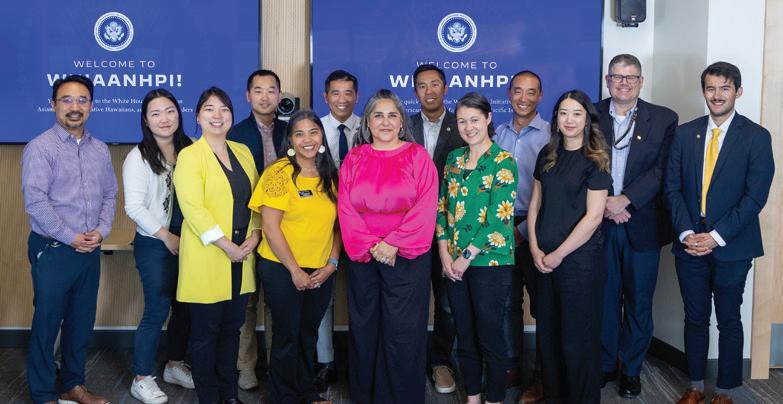
Members of CU Denver, United States Department of Health and Human Services Region VIII, and White House Initiative on Asian Americans, Native Hawaiians, and Pacific Islanders



On Saturday, September 21, over 10,000 attendees came out to this year’s Mid-Autumn Festival at Far East Center, which was their biggest one yet.
“We couldn’t be more thrilled by the sense of community, culture, and celebration that filled the air,” said lead organizer Mimi Luong Ye.
A Feast for the Senses with Asian Street Food | From the sizzling food stalls to the vibrant marketplace, there was something for everyone! The crowd enjoyed an amazing variety of international street food—everything from bánh mì and mooncake to pho, bao buns, and bubble tea. The food competition was a highlight, with local vendors serving up the best dishes for
exciting contests and giveaways.
Cultural Performances | The festival truly came to life with captivating performances showcasing the richness of Asian heritage. The stage was filled with traditional lion dances, mesmerizing cultural dances, live music, and even modern K-pop performances that had the crowd cheering for more. It was a beautiful way to honor the Mid-Autumn holiday while sharing the vibrant traditions of our community.
Family Fun & Giveaways | The festival was packed with activities for families! The food contests, lantern-making stations, and giveaways made it a day filled with fun and creativity. Kids loved decorating lanterns, while the

crowd enjoyed our prize giveaways and prize packages. We also gave out prizes for best lantern making for kids, adding extra excitement for everyone who dressed up.
A Day of Togetherness | This festival was more than just a celebration— it was a gathering of friends, families, and neighbors. Seeing so many people come together to enjoy delicious food, vibrant performances, and cultural traditions made this Mid-Autumn Festival truly special.
We are so grateful to our incredible partners, vendors, and volunteers who made it all possible.
Thank you to everyone who came out and made this event unforgettable. See you again next year!

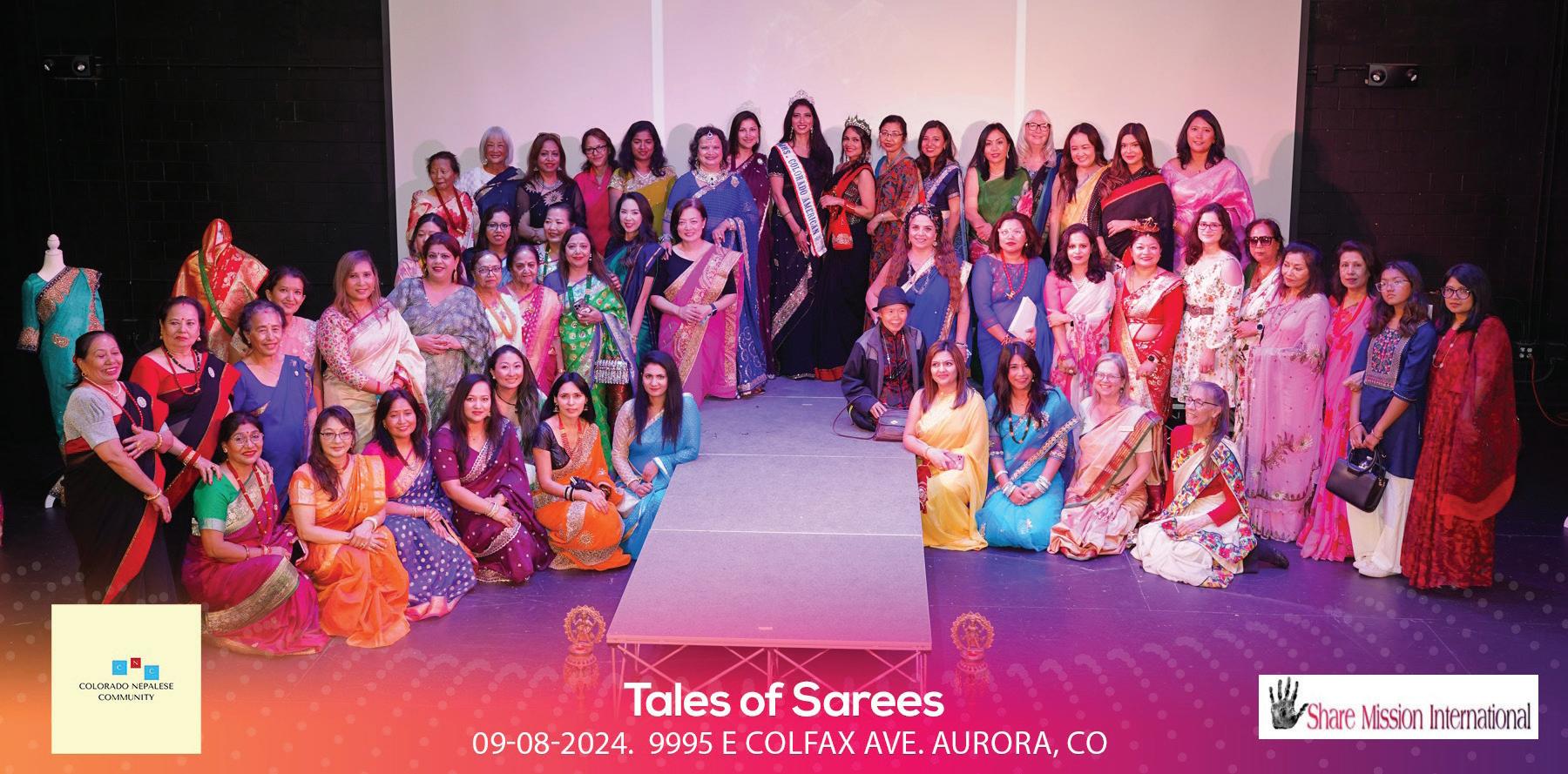
Saree always has a special importance and glory among women in the Nepali community.
Nepali women have a special relationship with sarees, no matter how many western outfits they wear while adapting to a new country, a new place, they adore saree which has been a cherished wear from generation to generation.
Last month, Colorado Nepalese Community and Share Mission International, jointly organized the “Tales of Sarees” program at The People’s Building in Aurora.
The event was very well attended by Nepali community members as well as the non-Nepali community, where most of the attendees dressed in a saree. It was one colorful event!
A variety of sarees including Haku

Patasi, Dhaka saree, silk saree, dupatta saree, georgette saree and cotton saree were exhibited at various stages of the program.
The event was inaugurated by Ms. Shanti Shrestha, president of Sankhuwasabha Community of USA by lighting a panas. “Panas lighting has a special meaning in Nepalese culture. Lighting a lamp or flame before a ceremony holds cultural, religious and symbolic significance in various traditions around the world.
It spreads divine grace also honoring a way to connect with our cultural roots and a thought to drive away negative energies and bring in positivity,” said Ms. Binisha Shrestha, Founder and CEO of Colorado Nepalese Community.
The event then proceeded with a poetry recital by Ms. Salina Amatya on “An

Ode to Sarees.”
By Binisha Shrestha
Dr. Purnima Voria, president of National US India Chamber of Commerce conducted a workshop on “An Art Of Saree Draping,” where most of the participants were non-Nepali community leaders including Rep. Eliza Hamrick, Ms. Danny Trigoso, Ms. Becky Hogan, Ms. Mimi Luong Ye, Ms. Minsoo Song, Ms. Patti Batteman, Ms. Christina Joymon, and Ms. Nga Vương Sandoval. After the workshop, participants presented a spectacular sari fashion walk on the ramp.
“I come from Nepal where we love our sarees,” said Binisha Shrestha. “A saree is an excessively long garment which women drape themselves in, and we have a saying in Nepal, which is nothing makes a woman look more beautiful than a saree does.”
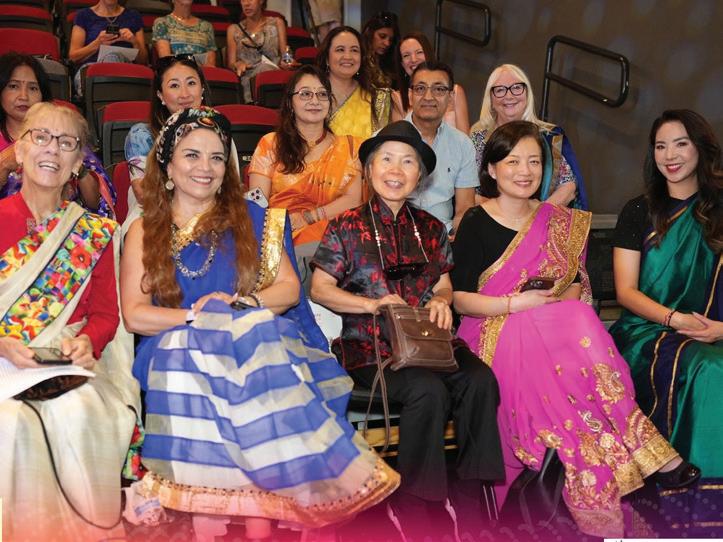
The main highlight of the event was a Nepali version of ode to saree fashion walk, which gave a special presentation starting with 7-year-old Saara Shrestha in haku patasi. Others included Avani Maharjan in Gufa Saree, Aryana Amatya in Gunyu Cholo attire, and Sabisha Shrestha in Nepali bride.
Prakriti Joshee walked in the first saree gifted to her from her mother after her marriage. Subhekshya Shrestha walked in her mother’s 30-year-old saree she wore to her work. Sumana Shrestha wore traditionally handwoven dhaka saree, and Sarina Shrestha wore a 50-year-old sari, hand embroidered by her maternal aunt. Pritina Shrestha, Salomi Maharjan, Merina Shrestha, Usha Adhikari wore party sarees for different occasions in Nepali celebrations.
The highlight of the event was when 84-year-old grandma Mina Paudel walked the ramp in Nepali Dopatta Saree. The entire audience cheered for her when she took off her oxygen tube and walked the ramp with such elegance.
The fashion walk was choreographed
by Sabita Shrestha and emceed by Ms. Sagarika Shrestha, who flew from New York to host the event. DJ Mani Maskey presented a special saree song “Ful butey saree”.
While giving vote of thanks, Binisha Shrestha said, “Our community is not a monolith, each sub community while sharing commonalities in certain areas, has its own nuances, historical challenges and contemporary struggles.”
She continued: “Even within the South Asian American population, there are myriad languages, cultures, socioeconomic factors and religions to consider. We all have our own story to tell.”
This Tales of Saree event was meant to further the path to accepting cultural identities and grow the tight-knit community we come from.
One of the attendees mentioned, “ I’ve been in love with my mom’s wedding saree since I was a 7-year-old kid. It’s an elegant red and golden embroidered one. I remember eyeing it with fascination and hoping one day I would get to wear it. As a teenager. I often
tried it on when my mom wasn’t home and rejoiced.”
According to Binisha Shrestha, representation doesn’t mean filling quotas or giving someone a few seconds of screen time to check a figurative box, it’s about pushing back against the stereotypes and giving people who’ve been left out of writing rooms and decision-making processes the space to their own stories.
“For when we feel seen, we learn to own and share our stories. These stories remind us that there is no need to prove or minimize ourselves for others’ comfort. That we deserve to show up as we are. And ultimately, that we matter,” said Binisha Shrestha.

Binisha Shrestha Founder/CEO, Colorado Nepalese Community

